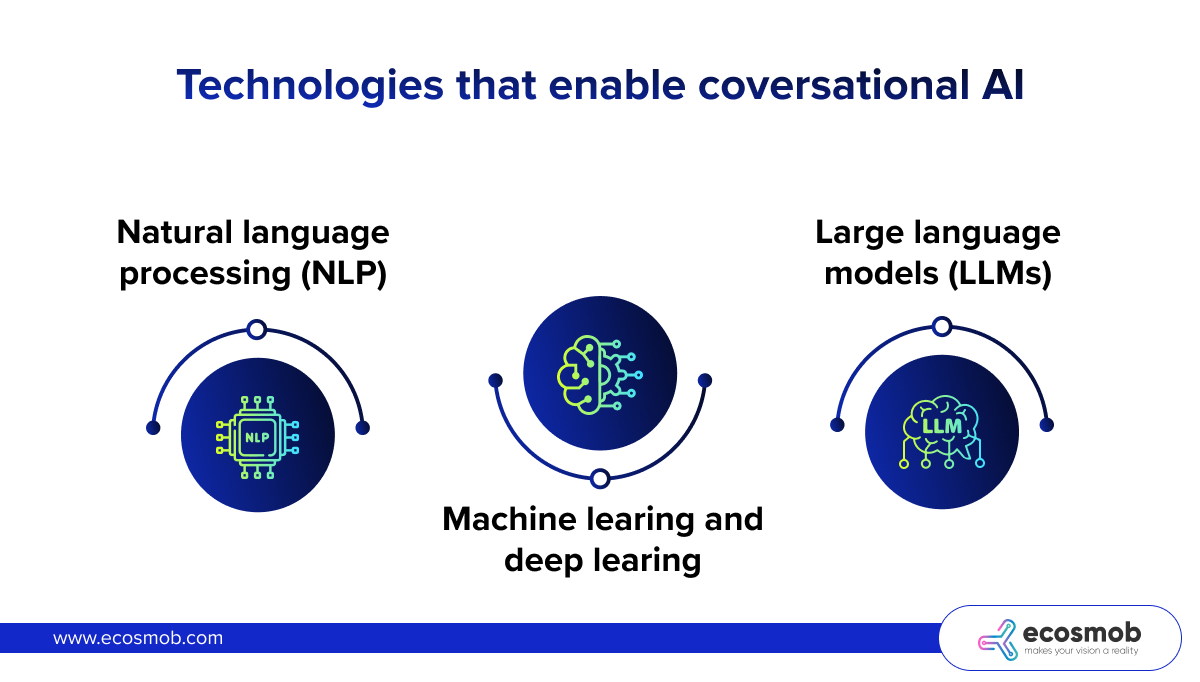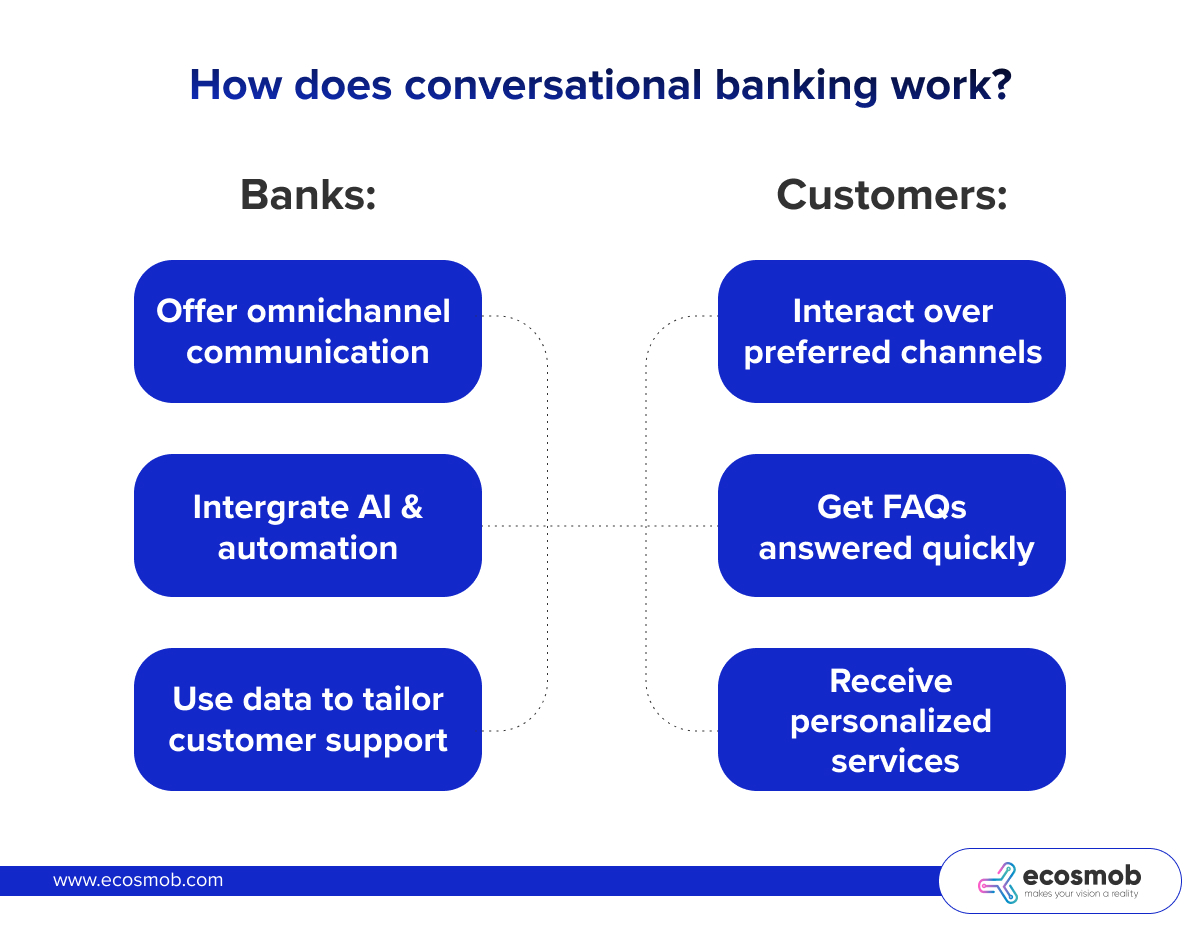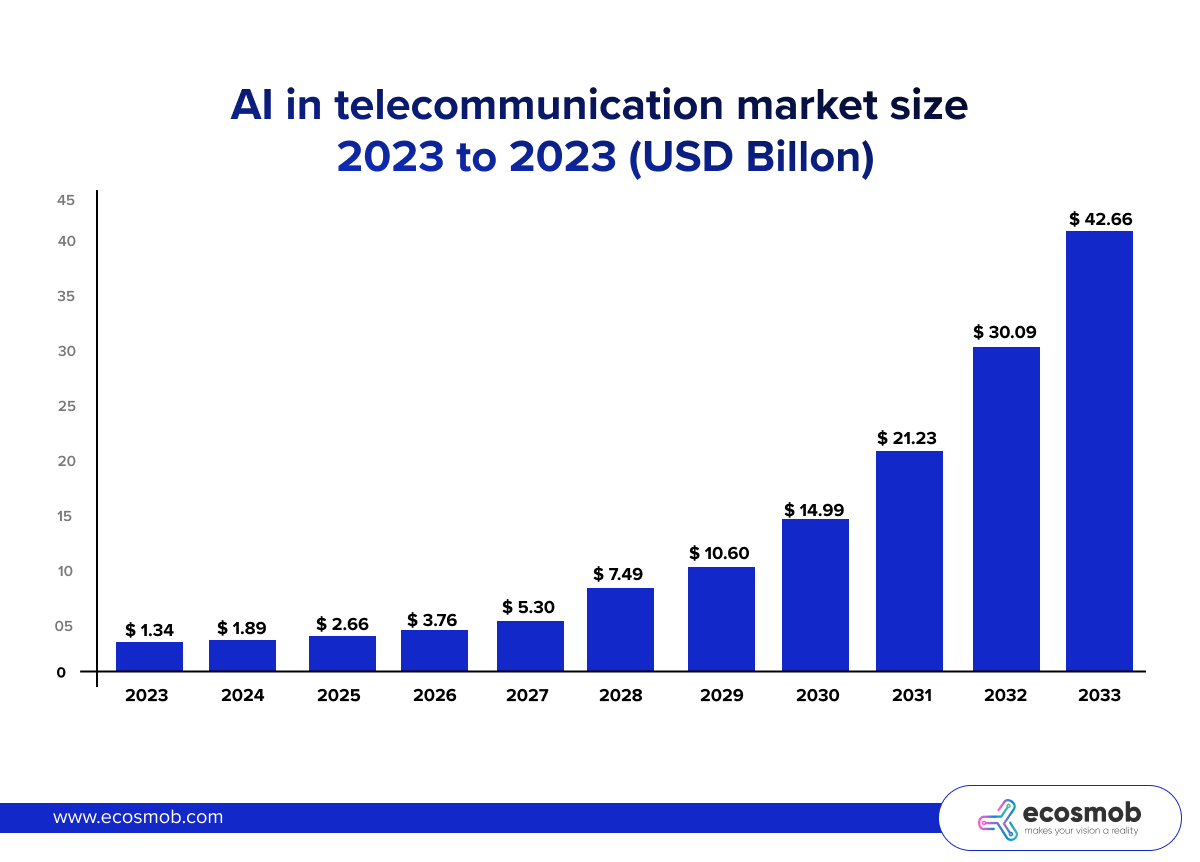This blog explains how conversational AI changes industries like healthcare, education, retail, banking, and e-commerce. Companies use AI to automate tasks and improve customer interactions.
Do you want to grow your business?
One key characteristic of any growing business is automation. A company without automation is not scalable for potential growth. It is just a business with limited growth boundaries.
Automation in business refers to automating business processes and operations, which means processing them without needing human resources with the help of technology and automation tools.
As a wave of AI technology with surprising capabilities hits the world every day, businesses are chasing it to leverage it for automation.
One buzzing word in business automation is conversational AI technology, which powers AI-powered conversational chatbots for communication. Businesses are exploring various conversational AI use cases for different purposes and applications. Conversational AI is used in industries to automate various operations and processes, including customer service, virtual assistants, shopping assistants, etc.
This blog post explores conversational AI technology and its benefits using some of the top 10 real-world examples.
What is Conversational AI technology?
Conversational (AI) artificial intelligence technology is a branch of AI technology that can understand human language and give relevant responses, providing a natural human-like conversation experience.
Conversational AI technology utilizes machine learning algorithms, natural language processing (NLP), and a large amount of data to train AI models to understand and generate human speech. Input to this system can be text or voice and in any language.
 Isn’t it like magic? Machines powered by conversational AI can now understand and talk with you like any other human being.
Isn’t it like magic? Machines powered by conversational AI can now understand and talk with you like any other human being.
You can use this magic in your business in various operations, especially where more human intervention and effort are needed for repetitive tasks.
What Are the Benefits of Using Conversational AI?
Successful businesses are obsessed with building relationships with their customers. This helps establish a connection between your brand and your customers. One way to build customer relationships is through effective communication using conversational intelligence.
One notable example of building relationships is Apple company.
Have you ever visited an apple showroom?
When you visit the Apple showroom, the staff will greet you with greetings like “Hello sir, Good morning, how are you ?” This gives customers a feeling of importance, and they tend to buy more even if they didn’t plan to purchase those products and exit the showroom with a warm thank you note from the staff.
According to Forbes, companies with a customer experience mindset drive revenue 4-8% higher than the rest of their industries.
But wait, we were talking about automation, right?
This is where Conversational AI for enterprise comes into the picture. With the help of conversational AI technology, you can replicate this strategy in your business.
When customers visit your website or customer service panels, you can add a chatbot powered by conversational AI technology. This AI bot will greet your customers, ask questions, provide personalized solutions, and build relationships with effective communication.
 This is just one example of the benefits you can get from implementing conversational AI for enterprise in your business. We can list a bunch of benefits with catchy headings, but to make it clearer and help you discover more ways to adopt conversational intelligence in your business operations, let’s go through real-world examples of conversational AI in different industries.
This is just one example of the benefits you can get from implementing conversational AI for enterprise in your business. We can list a bunch of benefits with catchy headings, but to make it clearer and help you discover more ways to adopt conversational intelligence in your business operations, let’s go through real-world examples of conversational AI in different industries.
Top 10 Examples of Conversational AI
1. Conversational AI in Healthcare
Conversational AI in healthcare has revolutionized the healthcare industry by allowing businesses to provide medical health support and other healthcare services through virtual assistance. This not only helps them reduce human resources costs but also helps them understand their customers more deeply using AI data analysis.
A McKinsey survey found that the use of virtual assistance powered by conversational AI in healthcare industries is gaining momentum. Adoption of conversational AI increased by 38%, and 40% of patients are satisfied and express readiness for virtual assistance in health services.
2. Conversational AI in E-commerce
In e-commerce, conversational AI technology is being used to enhance the shopping experience by allowing customers to buy products using voice commands. E-commerce companies also provide a chatbot with whom customers can chat, discover products, and buy instantly.
The AI chatbot explains features and use cases and also helps compare pricing in a conversation. It’s like discussing shopping decisions with your friend.
 Amazon Alexa is one of the applications of conversation AI in e-commerce. It is a virtual assistant speaker launched by a giant e-commerce company named Amazon. It allows customers to buy products from Amazon with a few voice commands without visiting the Amazon shopping website.
Amazon Alexa is one of the applications of conversation AI in e-commerce. It is a virtual assistant speaker launched by a giant e-commerce company named Amazon. It allows customers to buy products from Amazon with a few voice commands without visiting the Amazon shopping website.
3. Conversational AI in the Finance Industry
Banks are among the most large and complex institutions. They include repetitive processes and operations, such as creating new accounts, balance inquiries, loan applications, and account customer support.
Conversational AI streamlines these banking operations, improving efficiency and customer satisfaction.
 Bank of America is one example of leveraging conversational AI in banking operations. They introduced a chatbot named Erica. It is the most advanced and first virtual financial assistance in the world. The Erica Chatbot is helping Bank of America personalize its banking services for individual customers.
Bank of America is one example of leveraging conversational AI in banking operations. They introduced a chatbot named Erica. It is the most advanced and first virtual financial assistance in the world. The Erica Chatbot is helping Bank of America personalize its banking services for individual customers.
Since launching in 2018, Erica has helped nearly 32 million Bank of America customers manage their financial services through conversational AI in the banking sector. This is one of the very significant examples of the powerful duo of AI and Finance.
4. Conversational AI in Education
Companies in the education sector use conversational AI technology to engage and create learning experiences for students. A study conducted by the University of Murcia in Spain showed that AI chatbots provide personalized help with a 91% accuracy rate.
Duolingo, an edtech company, integrated conversational AI to help learners learn different languages, such as English, Spanish, and German, by simulating human-like interactions and engaging in conversational practices. These AI chatbots provide instant feedback to create an effective learning experience and showcase one of the most effective conversational AI use cases in education.
Are you interested in developing a Conversational AI solution for your business?
5. Conversational AI in Entertainment
Conversational AI chatbots are used in the entertainment and media industry to improve user experience and provide personalized recommendations of content based on customer’s interests and watched history.
One of the best examples of using conversation AI chatbots in the entertainment industry is Alexa voice assistance. Amazon integrated Alexa with their video streaming platform, Amazon Prime. This allows their viewer to manage their viewing experience using voice commands for different functionalities such as searching for new shows, controlling playback settings, and getting personalized recommendations.
6. Conversational AI in the Travel industry
Travel companies utilize conversational AI technology to help their customers with travel planning and personalized customer service through interactive conversational AI chatbots. Giving customers what they need and wherever they want to is a key secret for satisfied and loyal customers.
One notable example is a virtual travel agent provided by Expedia Group. This virtual agent helps travelers plan their travel journey. Through a conversational AI chatbot, travelers can book flights and hotels and even access rental car services in real time.
7. Conversational AI in Telecommunications
Telecommunications companies are among the first industries to show the rapid adoption of AI technology to improve business processes. According to research, the global AI market valuation in the telecommunications sector was $1.34 billion in 2023 and is projected to reach around $42.66 billion by 2033.

For example, Vodafone’s Tobi is a conversational AI assistant that helps Vodafone customers with billing inquiries, service upgrades, or issue tickets. The best part is that they do not need human efforts to serve customers; it is automated and available 24/7.
8. Conversational AI in Retail
Retail business is all about how you treat your customers and provide them with a satisfactory experience. No matter how big the retail business is, customer service is an essential part of the retail industry.
Saphora’s beauty assistance chatbot is an exceptional example of a conversational AI application. This AI Chatbot assists customers with virtual try-on experiences, recommends related products, and interactively answers product-related questions.
9. Conversational AI in Government Services
Worldwide, governments are promoting AI technology to provide government services to citizens. It helps government agencies provide public services more efficiently and effectively.
Deloitte reports that AI Conversational chatbots in Government have the potential to free up 96.7 million working hours across the federal government each year, a cost savings of $3.3B annually.
One example is the Ask the Expert AI chatbot launched by the UK government. This AI chatbot improves the public’s interaction with government services. It helps people access various information related to government services and schemes without filing any forms, which can take days or sometimes months to get a response.
10. Conversational AI in Call Centers
Call center is the point of customer care service of any organization and your headquarters from where you can handle and manage customer support experience.
HoduCC is one of the best call center software available in the market. It provides an integrated conversational AI chatbot feature that handles routine customer queries automatically and enables businesses to deliver a superior customer experience while optimizing efficiency and productivity.
 So, this is it. We hope you have gained an overview of conversational AI technology and how to implement it in your business and get benefits like the other businesses we have seen in the above examples. There are some other good real-world examples of AI as well such as AI in manufacturing, AI in finance industry and AI in supply chain that we will discuss in our other articles.
So, this is it. We hope you have gained an overview of conversational AI technology and how to implement it in your business and get benefits like the other businesses we have seen in the above examples. There are some other good real-world examples of AI as well such as AI in manufacturing, AI in finance industry and AI in supply chain that we will discuss in our other articles.
Moving on, by utilizing conversational AI technology in business, you can improve and automate your customer service, build relationships with your customers, and give your business a new growth direction.
At Ecosmob, we create conversational AI chatbots to enhance customer support, boost satisfaction, and reduce costs.
Contact us now to get started
Automate Tasks and Boost Engagement with Ecosmob’s Conversational AI.
FAQs
What is conversational AI technology?
Conversational AI technology enables machines to understand, process, and respond to human language naturally. It combines machine learning, natural language processing (NLP), and speech recognition to power AI-driven chatbots and virtual assistants.
Can conversational AI handle multiple languages?
Yes, advanced conversational AI models support multiple languages using natural language processing (NLP). This allows businesses to provide multilingual customer support and expand globally.
Is conversational AI secure for handling sensitive data?
Yes, conversational AI can be secure if implemented with strong encryption, authentication, and compliance with data protection regulations like GDPR and HIPAA. Businesses must ensure AI systems follow best security practices.
How does conversational AI in banking improve efficiency?
Conversational AI in banking automates account inquiries, loan applications, fraud detection, and customer support. It reduces wait times, enhances security, and provides personalized financial recommendations.
How does conversational AI improve customer service?
Conversational AI improves customer service by providing instant responses, handling multiple queries simultaneously, and offering 24/7 support. It ensures quick resolutions, personalized interactions, and a seamless customer experience.


